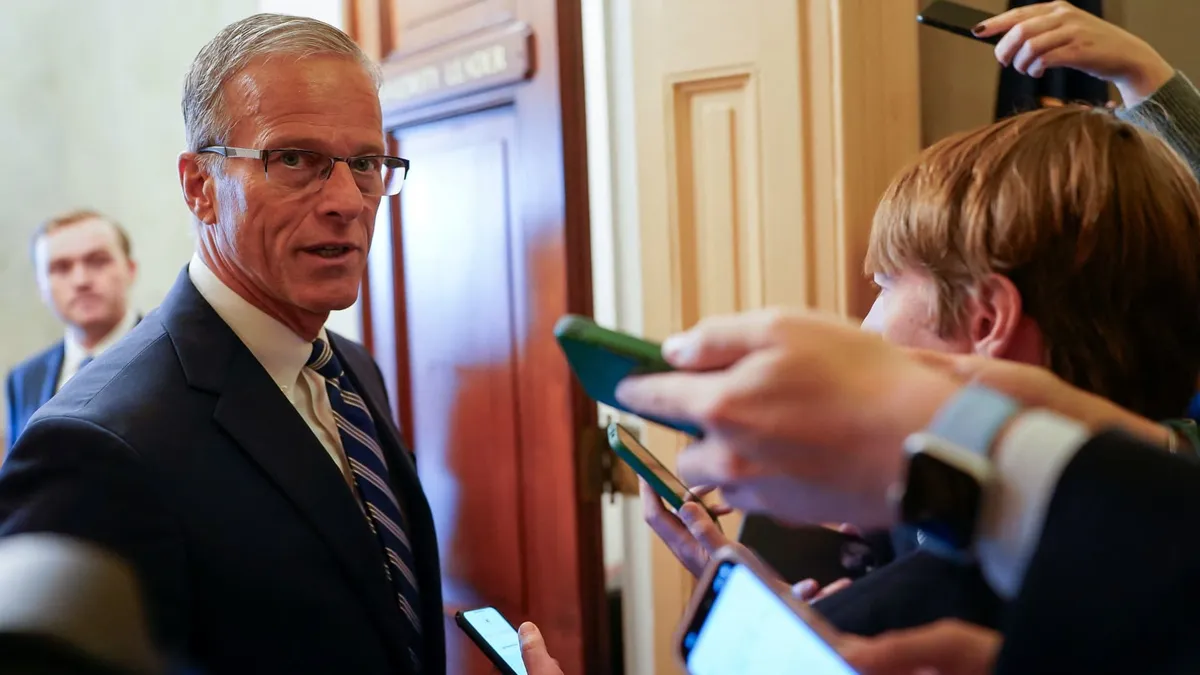
Bipartisan discussions in the U.S. Senate aimed at resolving the ongoing government shutdown have shown promising developments, as confirmed by Senate Majority Leader John Thune on Saturday. Lawmakers are diligently working on proposals to temporarily reopen the government and introduce three long-term funding bills designed for various federal agencies.
When asked by reporters about the nature of bipartisan talks that had occurred within the last 24 hours, Thune, a Republican from South Dakota, expressed optimism, stating, “Yeah. I’d say so.” As of Saturday, the federal government has been in a state of shutdown for 39 days, significantly impacting federal workers and disrupting essential services, including food assistance programs, air travel, and access to national parks.
After several weeks of stalled negotiations, both Republican and Democratic senators have resumed serious discussions late this week. On Saturday, they aimed to present the complete text of three funding measures for fiscal year 2026. These proposals will focus on crucial areas such as agriculture, food and nutrition programs, military construction, veterans’ initiatives, and the operational budget for Congress, funding these areas through September 30, 2026.
Additionally, senators are crafting a stopgap measure intended to provide more time to negotiate the remaining nine discretionary spending bills necessary for the continued operation of other vital government sectors, such as homeland security, defense, housing, and health services. North Dakota Republican Senator John Hoeven indicated that the current short-term funding plan, which expires on November 21, would be revised to facilitate the reopening of the government and extend funding through late January.
While Thune expressed hope that votes could occur on Saturday, he refrained from committing to a specific timeline, noting, “We’ll see how the day goes as people have an opportunity to firm up their views.” Despite the positive tone from Thune, Senate Democratic Leader Chuck Schumer criticized the Trump administration for allegedly withholding SNAP food stamp funding and accused it of politicizing the situation by limiting airline flights at certain airports.
During his remarks on the Senate floor, Schumer highlighted the refusal of Republicans to consider a one-year extension of an expiring health insurance subsidy as part of the legislation to reopen the government. To break the stalemate, it is likely that the support of at least eight Democrats will be necessary. Thune did not clarify how Republicans plan to address the Democrats’ demands regarding health insurance subsidies, which impact approximately 24 million individuals in the Affordable Care Act’s health insurance marketplaces.
Former President Donald Trump has called for a reevaluation of federal funding directed toward health insurance subsidies, suggesting that these resources should instead be allocated to direct payments for individuals. He stated, “I am recommending to Senate Republicans that the hundreds of billions of dollars currently being sent to money-sucking insurance companies in order to save the bad healthcare provided by ObamaCare, be sent directly to the people.”
Trump’s proposition, made through a social media post, did not include specific details but indicated a shift toward empowering individuals to purchase their own healthcare. This comes as the ACA marketplaces continue to serve those without employer-provided coverage or access to government healthcare programs like Medicare and Medicaid.
As the Senate prepares to reconvene after rejecting legislation aimed at resuming paychecks for hundreds of thousands of federal workers, the repercussions of the longest government shutdown in U.S. history are becoming increasingly evident. Critical programs have been severely affected; for instance, around 10,000 young children and families have been deprived of Head Start early-learning and nutrition services due to closures across 18 states and Puerto Rico, as reported by the First Five Years Fund.
These early learning programs faced funding deadlines of October 1 and November 1, which were halted due to the government shutdown that commenced on October 1 when appropriated funds were exhausted. The urgency for a resolution to this stalemate is becoming more pronounced as the ramifications of the shutdown continue to unfold.